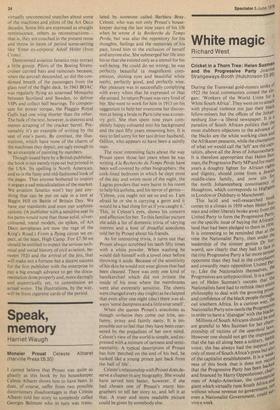Speak, memory
Harriet Waugh
Monsier Proust Celeste Al baret (Harville Press £6.50) I cannot believe that Proust was quite as ghastly as this book by his housekeeper Celeste Albaret shows him to have been. It does, of course, suffer from two possible distortionary disadvantages in that Celeste Albaret told her story to somebody called Georges Belmont who in turn was trans
lated by someone called Barbara Bray. Celeste, who was not only Proust's housekeeper during the last nine years of his life when he wrote A la Recherche du Temps Perdu, but was also the repository for his thoughts, feelings and the memories of his past, loved him to the exclusion of herself and anyone else. She submerged her life into his so that she existed only as a utensil for his well-being. He could do no wrong; he was perfectly beautiful (a magnificent complexion, shining eyes and beautiful white teeth), perfectly good, and perfectly wise. Her pleasure was in successfully complying with every whim that he expressed or that she sensed. In return Proust was very fond of her. She went to work for him in 1913 on his suggestion to help her overcome her discontent at being a bride in Paris (she was a country girl). She then spent nine years completely happy coloured into his background and the past fifty years mourning him. It is easy to feel sorry for her taxi driver husband, Odilon, who appears to have been a saintly man.
The most interesting facts about the way Proust spent those last years when he was writing A la Recherche du Temps Perdu have been well covered by other biographers: the cork-lined bedroom in which he slept most of the day and wrote most of the night, the Lagras powders that were burnt in his room to help his asthma, and his terror of germs— 'Celeste, you ought not see so and so. I am afraid he or she is carrying a germ and it would be a had thing for us if you caught it.' This, in Celeste's eyes, shows his concern and affection for her. To this familiar picture she adds a list of domestic trivia of varying interest and a host of dreadful anecdotes told her by Proust about his friends.
As for interesting trivia, it turns out that Proust always scrubbed his teeth fifty times with a white powder. When washing he would dab himself with a towel once before throwing it aside. Because of the sensitivity of his skin he would not wear gloves that had been cleaned. There was only one kind of handkerchief which did not irritate the inside of his nose where the membranes were also extremely sensitive. The sheets were changed every day (night) as he claicned that even after one night (day) there was always 'some dampness and a littlesour smell'.
When she quotes Proust's anecdotes as though verbatim they come out trite, unfunny, prissy and faintly nasty. It is im
possible not to feel that they have been coarsened by the prejudices of her own mind.
Celeste's view of the world is simple, and ex pressed with a mixture of tartness and sentimentality. A typical description of Proust has him 'perched on the end of his bed, he looked like a young prince just back from the ball of life'.
Celeste's relationship with Proust does deserve a chapter in any biography. She would have served him better, however, if she had chosen one of Proust's many biographers to tell her story to, and left it at that. A truer and more readable picture could be given by somebody else.


































 Previous page
Previous page